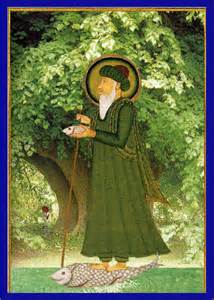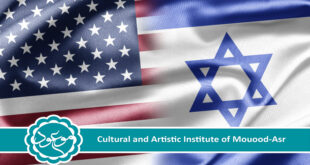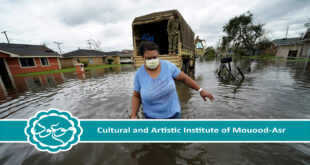Praise be to Allah Most Wise, and peace and blessings on the beloved Messenger of Allah (sallalahu ‘alaihi wa sallam) who lamented that Musa (‘alaihi al-Salām) did not show more patience with Khidr(‘alaihi al-Salām), the supreme teacher and guide of Ākhir al-Zamān, for had Musa done so, we would have learnt more from Khidr through Sūrah al-Kahf of the blessed Qur’ān.
The world today is akin to the skin of a banana which has been tossed into a garbage-bin and is rotting. Those who have hearts that can penetrate that reality of the world today, are a people who consequently feel lost in what has become for them, an alien world. They feel disgusted (i.e., fed-up) with this world. They long for a way out of a lonely tiresome life devoid of peace, contentment and true happiness.
The few who are disgusted with the world today look with pain and increasing frustration at the rest of mankind who consider this to be the best world ever, and whose greatest joy is to visit the glittering shopping malls of tinsel-town in order to spend more and more paper, plastic and electronic money while shopping for rotting banana skins.
It is to such people – the few who feel lost in today’s strange world – that Sūrah al-Kahf speaks, perchance that they may hear. It conveys to them a message that ‘they need to turn around and retrace their steps in life while searching for that rock on which sits the supreme guide of the age’. Only that guide can explain the reality of the world today, and only that guide can provide such guidance as would show the way to escape from the dangers that await them wherever they turn.
Allah Most High has personally warned of the awesome dangers to faith that will permeate the world in the end-time when He declared, in a Hadīth al-Qudsi recorded in Sahīh al-Bukhārī, that 999 out of every 1000 (in Ākhir al-Zamān) will enter into the hellfire.
WHERE CAN A KHIDR BE FOUND? HOW TO RECOGNIZE HIM?
The teacher par excellence of Ākhir al-Zamān can be recognized because he sits on a rock and is therefore as firm as a rock in his thought. He is not a drifter sitting on drifting sands whose viewpoint drifts in whichever direction the wind is blowing in London, NY, Paris etc.
If, for example, the model of conduct of Prophet Muhammad (sallalahu ‘alaihi wa sallam) does not allow for men and women to shake hands or to embrace and kiss each other when greeting each other socially, and if Dajjāl has fashioned a new universal religion and way of life which makes it necessary or permissible for men and women to do so, the Khidrof such a age (and those who follow him) would stand firm as a rock in refusing to conform with such a sinful departure from the Sunnah of the blessed Prophet. Those, on the other hand, who sit on shifting sand, will constantly adapt themselves to conform in their conduct with whatever Dajjālrequires of them even if this requires them to betray Nabi Muhammad (sallalhu ‘alaihi wa sallam).
The teacher of the End-time can be found at Majm’aa al-Bahrain (i.e., the place where the two oceans meet – the ocean of knowledge externally acquired and the ocean of knowledge internally received); and because He integrates these two oceans of knowledge into a harmonious whole, his knowledge is not mechanical. He does not memorize this Kitāb (book) and that Kitāb and the other Kitāb,and then spend the rest of his life repeating by rote the same thing over and over again like a parrot. Rather fresh knowledge and original thought flows from him like raindrops falling on a barren soil. He teaches, and lo! everything becomes lush green – and that is how he got the name Khidr which means green.
Just as he brings the dead earth back to life, so too does he bring dead hearts back to life while giving meaning and purpose to life. He is a supreme shepherd who can recognize the wolves of this age, and who knows how to protect the sheep from the wolves.
The teacher can be recognized because he has two distinct qualities. Firstly, he is always a man (never a woman) of supreme kindness and compassion, and secondly, he is blessed with internal intuitive spiritual insight in consequence of receiving knowledge directly from Allah. That spiritual insight gives him the capacity to recognize and to interpret knowledge which has come from above in an external form (the ‘boat’, the ‘boy’ and the ‘wall which was crumbling’) which requires interpretation in order for its internal reality to be penetrated and thus correctly understood.
Knowledge that has come from Allah Most High is located first of all in the blessed Qur’ān which is comprised of Ayāt (verses) which are Mukhkamāt (plain and clear), and others which are Mutashabihāt (i.e., which must be interpreted). Sūrah al-Kahf sends a message that the Ayāt Mutashabihāt of the Qur’ān have to be interpreted in order for mankind to penetrate the reality of the world in Ākhir al-Zamān.
After Khidrhad explained to Musa that which had been incorrectly understood, he declared to Musa, “this is the t’awīl (interpretation) of that which you had no patience to understand.” Sūrah al-Kahf has here conveyed the important information that the interpretation of religious symbolism is not possible without knowledge received directly from Allah Most High.
The teacher of Ākhir al-Zamān who sits on a rock, is capable – by Allah’s leave – of looking ahead to see events which are yet to unfold in the historical process. Such insight into the future is beyond the capacity of conventional thought -hence Musa (‘alaihi al-Salām), who represents Banū Isrāīl, was completely ignorant of the fact that a King would come to seize the boats, or that the boy would grow up so dangerously misguided that he would be a threat to his parent’s faith.
The knowledge which allows for insight into future events would be critically important in Ākhir al-Zamān when the world-order of Gog and Magog (which is the present Judeo-Christian Zionist world-order) would seek to dispossess the masses of mankind of their wealth and property in order to reduce them to such poverty and destitution as would equate to slavery. Such conditions of slavery would be necessary if Dajjāl is to ever succeed in establishing his rule over the world.
Such knowledge would also allow the believers to understand Dajjāl’s strategy with which he seeks to corrupt the youth in Ākhir al-Zamān, and then use them to destroy the faith of their parents and other elders. The believers would know to respond appropriately by cutting-off ties when the dangerously misguided young in Ākhir al-Zamān (who can include their own sons, daughters and grand-children) pose a future threat to Imān (faith) of their parents, grand-parents and other elders.
The knowledge and spiritual insight of a teacher and guide such a Khidr (‘alaihi al-Salām), permits him to not only see into the future – by Allah’s leave – but to also see into the past and to thus uncover what has been, or may have been, carefully concealed. Thus was it that Musa’s (‘alaihi al-Salām) conventional knowledge and powers of understanding could not make sense of a wall being charitably rebuilt in a town that was so inhospitable. The implication of this kind of knowledge or insight in Ākhir al-Zamān, is that it makes it possible for such a guide to re-read and to reinterpret history quite differently from what has been recorded as history.
HOW WILL TEACHER AND STUDENT RELATE TO EACH OTHER?
That teacher and guide does not search for, screen and select his students – not in Ākhir al-Zamān – rather, the students must search for the teacher, and when they find him, they must seek permission from him to keep his company so that they may learn from him.
Sūrah al-Kahf warns the would-be students that the methodology of study used by such a teacher is different from that which is normally employed when students are taught. The student may not question and enter into arguments while challenging this teacher, other than to humbly and politely seek further clarification or explanation. The student does not debate with this teacher. Rather the student waits with patience for an understanding of what was taught, or for what the teacher has to offer as further explanation and clarification.
The teacher is not infallible. If the student is not convinced that the teacher is rightly-guided then he should leave him and seek another teacher. But the student may not argue and debate with this teacher.
A MESSAGE OF WARNING
This teacher does not put up with those who have no patience to acquire knowledge from him -knowledge which otherwise would remain permanently beyond their reach. If an impatient student persists in expressing differences of opinion with this teacher, that student will eventually be dismissed from his company.
 Mouood Mouood English Edition
Mouood Mouood English Edition




